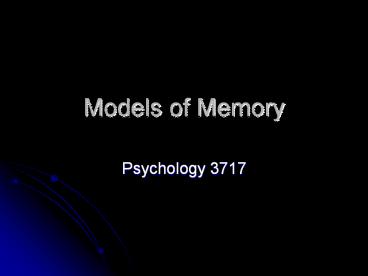Models of Memory - PowerPoint PPT Presentation
1 / 15
Title:
Models of Memory
Description:
Models of Memory. Psychology 3717. Introduction. Really there are two types of models ... Only true with explicit memory (though see Challis and Brodbeck, 1992) ... – PowerPoint PPT presentation
Number of Views:18
Avg rating:3.0/5.0
Title: Models of Memory
1
Models of Memory
- Psychology 3717
2
Introduction
- Really there are two types of models
- Models that look at specific phenomena
- ACT or TLC for example
- Models that look at general organization
- Atkinson and Shiffrin for example
3
But why model?
- Models organize data
- Models make explicit predictions
- Models can lead to application
- When you think about it, the first two are what
science is all about, so models help us get
beyond simple description
4
SAM
- Search of Associative memory
- Math model
- Basically looking at list learning results
- So study list
- Then recognition or recall
5
Assumptions
- Target items are viewed in relation to the memory
representations of all other items learned - This includes the words, the context etc
- To be learned items are associated with the
context - When words are presented they are rehearsed
- Words have a familiarity value
- Old v new decisions are based on familiarity vale
- Basically a signal detection approach
6
Memory strength
- Based on rehearsal during encoding
- Association between the stimulus and the
representation of the word itself - Association between the stimulus and the context
- Item retrieval based on prompt by the experimenter
7
Retrieval
- Retrieval depends on the joint contribution of
the context, of all other items and the item
itself - So the strength is, basically, the sum of all the
associative strengths in the list - This explains why recognition is easier than
recall
8
Explains a lot
- Longer presentations, better memory
- RI effects (context changes subtly)
- Serial position
- Encoding specificity
- Recognition failure of recall
9
Nice eh!
- Yeah, but.
- Makes a lot of assumptions
- Why arent all items recognized when one is?
10
Levels of Processing
- Craik and Lockhart
- Memory is NOT just this passive thing
- It is the result of encoding
- Perceptual analysis
- Pattern recognition
- Semantic elaboration
11
LOP is A OK
- Semantic processing produces better memory than
perceptual processing - Conceptually driven vs. Data driven
- Only true with explicit memory (though see
Challis and Brodbeck, 1992) - Deeper semantic processing, better memory
- Read generate effect
12
Levels
- Depth seems sort of vague though
- Hmm, when do you get better memory?
- Well when you have deeper processing
- How do you know you have deeper processing?
- Err umm cuz you have better memory
- Transfer appropriate processing may be a bit of a
better concept
13
Memory systems approaches
- Tulving and episodic / semantic distinction
- One is explicit, one is implicit
- There is physiological evidence of a sort
- Tulving maintains that only humans have episodic
memory - For him, it involves consciousness because it
must be self referential - I dont agree really
14
Why would there be multiple systems?
- Sherry and Schacter, 1987
- When a problem shows up that cannot be solved
with the present system a new one will be
selected for - So, our memory for facts could not deal with
autobiographical stuff - Or, birdsongs cannot be remembered with simple CS
US associations
15
Conclusions
- Models are cool
- They can be tested because they will make
explicit predictions - They organize data
- They cannot have too many assumptions, the fewer
the better































